Establishing a non-profit organization can be a rewarding entrepreneurial experience that allows you to be creative and bring your passions to work every day. Today’s guest talks about the success of his nonprofit startup and shares great advice in our career videos for anyone interested in starting a charity organization.
SNEAK PEEK (Full Episode + Transcript below)
|
RELATED CAREERS |
Today’s Guest
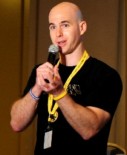 Jonny Imerman: Founder of Imerman Angels
Jonny Imerman: Founder of Imerman Angels
Grad School: Wayne State U School of Business in Detroit, MI
College Major: Psychology
College: University of Michigan in Ann Arbor, MI
High School: Cranbrook Kingswood School in Bloomfield Hills, MI
First Job Ever: Camp counselor
Worst Job Ever: Commercial real estate
Non-Profit Marketing Strategies
Jonny talks about the importance of public speaking to market your cause as well as hosting free events, fundraising events, building partnerships with other organizations, making and wearing t-shirts and wristbands, and much more. Jonny launched his nonprofit startup as a result of his own experience as a cancer patient. Imerman Angels provides peer-to-peer cancer support by connecting cancer fighters, survivors and caregivers. He is our second guest this month whose life being touched by cancer led to making a career change. You’ll find that Jonny is a passionate, inspirational guy whose efforts are helping thousands of lives.
Establishing a Non-Profit Organization
Jonny shares great advice including the importance of surrounding yourself with a great board of directors with diverse skill sets – even including an attorney on the board who can handle setting up a 501c3, amongst other things. He advises that starting a charity organization takes a ton of work – so you’d better be passionate about the cause, have a lot of patience and be able to live lean while your nonprofit startup gets established. I’m thankful that Jonny is sharing his inspirational story and advice with all of you – especially today, which would be my mom’s birthday if not for lung cancer. Be sure to check out Idealist, one of the top nonprofit resources.
FULL EPISODE
For our Audio Podcast: Careers Out There on iTunes
TRANSCRIPT OF TODAY’S INTERVIEW
Careers Out There Host Marc Luber: Hey everyone – welcome to Careers Out There. I’m your host Marc Luber and we’re helping you find a career that fits you. Today we’re looking at how to build and run a non-profit organization from scratch -it’s something all you guys can do – whether you’re looking to help veterans or children or animals or save the environment – whatever it might be, you can go out there and make a difference. Our guest today is doing just that. His name is Jonny Imerman and he runs Imerman Angels out of Chicago. They’re a cancer non-profit and he’s built it over the past 5 years into a great success. He’s gonna tell us all about how he did it and how you guys can do it too. He’s got a ton of energy, a ton of passion and you’re really gonna like hearing from this guy, so stick around. OK we’re back – Jonny, welcome to Careers Out There.
Imerman Angels Founder Jonny Imerman: Thank you so much for having me, Marc. I’m flattered to be here.
Host Marc Luber: Yeah – thanks for being here! So everyone should know – Jonny and I met at a party a few years ago in Chicago. I was in Chicago, went to a random party, met Jonny, we started talking about the cancer non-profit world. I volunteer for an organization out here in L.A. and so we had a lot to talk about. I was fascinated by what he was doing, he’s got more energy and enthusiasm than anyone I’ve ever met – He’s a really inspirational guy, so I’m really excited that he’s here so you guys can hear from him directly today. Here’s what we’re gonna do. First we’re gonna talk about what Jonny’s done, what his organization Imerman Angels does, and then we’re gonna get into the nitty gritty of how you guys can do it too – so that you can also build something in the non-profit space for a passionate cause that you’ve got that you want to run with it. So let’s start with Jonny. Jonny, what does Imerman Angels do?
Imerman Angels Founder Jonny Imerman: Imerman Angels is the largest one-on-one peer cancer support network in the world that we know of, to our knowledge. When I was going through cancer, I was 26 years-old. Beat it at 27 years-old, it came back again at 28 – 4 tumors came back on my kidneys. I beat it again at 29 fortunately, about 6 years ago. Now I’m 35. But more important than my own personal experience with cancer was what I learned along the way and wanted to change something significant in the system. I had the most amazing friends, I had great family, I had an awesome network of support – but I looked around the room and no one could look me square in the eye and say, “look buddy – I get this cause I’ve done this before – I’ve already been through the cancer – I know exactly what you’re talking about – and I beat it.” And THAT’s what I was looking to find when I was alone at 26 fighting cancer: a buddy, a peer who understood. So what we did is we got together with a group of survivors that now grows every single day and we created a network of thousands of survivors called Imerman Angels. So if somebody’s diagnosed with any type of cancer, all you need to do is call Imerman Angels. We’re going to find you a survivor that’s your age, beat your cancer, at the identical stage level, is the same gender as you, and can say, “look I’m just like you – I’m your future twin – except I’m done – I crushed the cancer – I speak the language – I’ve walked the walk and crossed the finished line – what do you want to know – I’m here to help you.” So one-to-one, peer-to-peer we match survivors up with someone with cancer today to make sure they get to that finish line. And that’s what it’s all about – no one should fight this disease alone. No one should wake up the next morning after being diagnosed and feel like, “I’m the only one in the world with brain cancer or lung cancer or bone cancer in your toe.” There’s always someone out there like you who wants to help, who speaks the same language, who can really shed light on the road ahead. That’s what it’s all about. The trail’s already been blazed. Survivors need to come back and make sure that the guys that are sick get down this trail and find their way to that finish line and get their lives back.
Marc Luber: That’s incredible! Very very noble cause. So tell us, then, how did you find these people that join the network and how many have you had so far in the network?
Jonny Imerman: We have had – wow – we’ve got about 3500 cancer survivors today in our network. It’s the largest network that we know of out there. And really how we found them all is 3 main ways: The number one way is probably hospitals: doctors, nurses, social workers. I spend a ton of time going to the hospitals. So when people treat people who are sick with cancer, they want to refer them to us the second that patient says, “I’m so alone, I wish I knew someone like me – is there anybody else that’s also done the same medicine or that chemo or this radiation?” So hospitals are huge. Number 2 is: Cancer partners. Livestrong, Leukemia Lymphoma Society, children’s groups: I’m Too Young For This Cancer Foundation, Mass Kickers – all these other cancer foundations that do great things but don’t do one-to-one peer support, they can send us people and we’ll match them all up. They also help us find survivors who want to give back. Those are the angels who want to get engaged and do something to help more people. The 3rd way: Is all the in-betweens. Kind of like the sweat. T-shirts, wristbands, water bottles, online media, Facebook, Twitter, My Space, anything we can do to spread the word, you know, talking it up. Sending an email out to 40 of your friends saying I just learned about this charity called Imerman Angels. Whatever we can do to drum up attention. Articles in the Wall Street Jounral, articles in the Chicago Tribune. All that helps to get the word out and raise awareness so people that are sick out there know where to go. Cause we can help everybody but if we can’t find them or they don’t know where to go, we can’t help them. Those are the 3 main ways that we find both fighters, survivors and caregivers. An important point is we do help caregivers as well – so if you have a mother, let’s say, of a 3 year-old with leukemia, she’s alone, scared – we’ll match that mom and dad up with another set of parents who can say, “guess what – my kid beat what your kid has 5 years ago – and we get it cause we’ve been there – my kid’s now 10, she grew her hair back and she’s on the playground and goes to school and she’s fine – she’s great – you know, she’s OK” so her family can help their family.
Luber: Very very cool. So all this stuff, the building that you’re doing, the marketing, the t-shirts, the wristbands, finding people, it all sounds to me like being an entrepreneur and running a company. Would you say that it’s a very similar kind of a thing?
Jonny: You know really it is, of course it’s a program-driven company, so it’s all about changing the cancer world. The mission is to help people with cancer and to connect the cancer world and nobody fights alone. But it is a company in the sense that we rely on donations from the community that come in and we have 4 people full-time on staff and if we don’t think a little bit about in-flows and out-flows we might run into trouble. We have to be very careful how we spend every dollar. Every dollar we spend, we always think “how does this further the mission – does this absolutely help people with cancer – is it absolutely necessary to spend this dollar to get to somebody sick and help them”. So it does run a little bit like a business in that way with in-flows and out-flows. You have to make sure that – you know, the general rule of thumb is that 80% of what comes in for the year is used to run the operations of the company and 20% stays in reserves. That’s the general rule of thumb for non-profits. It is important to think a little business-minded. But if you are like me and you don’t like the business side of it, you do it only a little bit as long as you have to and then you hire other people like the ones behind me here – you find other people that are operating people – that like the business side and to run it for you. Because me as the founder, as a survivor, is the reason we started this, I want the people side. I love the people side, I love meeting the guys that are sick, I love meeting new survivors, I love connecting the dots and making sure the program is working. So the key point: for any listeners out there building their own non-profits, the key point is: DON’T DO THE JOBS YOU REALLY DON’T LIKE – BECAUSE WHAT YOU DON’T LIKE IS USUALLY WHAT YOU’RE NOT VERY GOOD AT – AND THE THINGS THAT YOU LOVE THE MOST OR ARE THE MOST PASSIONATE ABOUT – FIND A WAY TO FOCUS AS MUCH TIME AS YOU CAN ON THOSE THINGS – BECAUSE YOU’RE REALLY GOING TO HELP THE CHARITY MUCH MORE THAT WAY.
Luber: That’s great advice. And I think even for a for-profit company it’s the same thing. As soon as you can afford to bring someone else on, bring them on and have them doing those other roles.
Jonny: Exactly right. It’s the exact same thing for for-profits. It’s just the mission is a little different.
Luber: So how long would you say it took until it wasn’t just you – you had a team and were able to fund a team and not just be hanging out there in the wind?
Jonny: It took a while. I will say it’s a total dedication. When you start a non-profit, you want to change a part of society, a part of the world – it’s a total commitment. When I went full time, I did it part-time through my own treatments – about 2003 we started until about 06. I just did it after work and I would connect people because I thought it was so important to help people that are sick to find survivors. I just did it on the side after work and weekends. But in 06 when I went full time, I worked for 8 months straight, pretty much every minute: 24/7 for no pay at all. We didn’t have anything in the bank in those days. At 8 months, enough funds had come in where my board of directors said, “OK we can pay him a small salary” and that’s when it began. And then about a year after that we hired the first employee. About every year we hire 1 new employee. Now it’s 2010 of course and in our 5th year we have 4 of us full time. But slowly you – you do everything at the beginning because you just have to. You do the pair-ups, you do the events, you do the awareness, you do the interviews, you do the radio shows, you meet new survivors, you go to the hospitals, you meet doctors and nurses….you do everything! You make connections with other cancer partners. Every minute you have to be on. You’ve gotta be. But when you choose to do it, you love it so much – there are very few things in the world I can do going this rate.
Luber: And that’s why when we were talking on the phone you told me that Passion is really the #1 key thing to doing this.
Jonny: PASSION IS ABSOLUTELY #1. There’s nothing else in this world that I can work these sort of hours. It doesn’t feel like work to me – so it’s easy to be passionate. I’ve realized that every ounce of energy I put into this is one step closer to some 19 year-old kid in New Mexico who’s got leukemia, who’s terrified and we’re getting the word out. If we find him, we already know a 22 year-old kid who beat leukemia, maybe lives in Tulsa, Oklahoma, who should be helping that kid – and we can connect those dots. But when that passion is alive and burning inside of you and you know that every breath you take towards this mission is one step closer to changing a life, and making a friendship for someone who really really needs it – that’s what it’s all about. Without that passion, it’s like why even come to play ball – you do it because you believe in it, it works and you know it’s gonna help people.
Luber: Exactly. Now what about money? People say, “oh, I’m scared to do a non-profit because I’ll be poor forever” or “I’ll have to starve”. You can draw a salary from the funds, isn’t that right?
Jonny: That’s right. There’s 4 of us full-time here who are all on salary – and I’m one of them. The board of directors decides my salary. So I’m a board director but the other board directors, when they discuss my salary, I have to step out of the room legally – I can’t be involved, I can’t discuss it, I can’t even discuss it outside of the board room with them ever. My salary – it’s completely up to the board to change my salary and set it, which is a checks and balances system that’s obviously very smart – because people shouldn’t be setting their own salaries of course. So they set my salary but then the other leaders here at the organization, myself and the board, we’re able to set the salaries for the other employees, so that’s really how that works. We manage really the office from that, from that standpoint. But basically anyone that’s afraid of not being able to make a living and eat – it is a choice – it is a risk. I mean, I say everything’s a risk in life. But I sort of looked at life as like I’m throwing money out the window – no matter how much I make, this is something I would like to wake up every day and do and I just had blind faith and just trusted it that this could work – we’ll find a way to do it. I never worked for a non-profit, I didn’t know anything about non-profits, let’s just figure it out along the way. And, you know, 4 years later, this organization supports 4 people and helps thousands and thousands of people with cancer every year.
Luber: Right. And again, it’s like being an entrepreneur in the sense that just because you’re starting a business doesn’t mean that you’re ever going to be able to eat as a result of that business!
Jonny: Very true.
Luber: It’s the same thing. You’re diving in, you’re taking a chance and you’re going for it – you have to just want it. So, you mentioned the board – let’s tell everyone – first, what is the board? What is their role in the non-profit and how do you choose a board?
Jonny: Sure. The board is a big piece. There’s no question about it. The board can help in a lot of ways. They can also hurt you too, though. Too many board directors can be a bad thing because managing them all and keeping everybody on the same page could be difficult, trying to get them all together….But our board is 5 board directors. Relatively small, very nimble. Every one of them is very engaged. I talk to almost every one of them every week. At least once a week or once every 2 weeks – we’re very very close. And for anyone out there listening – WHEN YOU BUILD A BOARD, YOU REALLY WANT TO THINK LONG AND HARD ABOUT who you choose to be on it because you want them to be honest and you want them to be straightforward and the business world or whatever world they have a great reputation, not a checkered past, you don’t want blemishes that does damage the credibility of your mission or organization. And you really want to think about people who care – that are as passionate – almost as you are – in the cancer world – for us, we have doctors on the board, an oncologist, another ER doctor, and these are people that see people with cancer. They’re really passionate about helping people with cancer in other ways besides being a doctor. Cancer survivors on the board – makes sense for us because you’re touched by it. YOU ALSO WANT TO LOOK AT a variety of skill set that the board brings to the table – for example – they can help you a lot because they’re not paid – in fact, most board directors raise money for the charity and help the charity – but really they’re advisors – that’s their role – they’re advisors to the guys that run the charity. Guys like me can go to the board and ask questions and get advice from people who are a little older, wiser, more experienced, maybe smarter and just can help. But you want to get a board of directors I think that’s diverse – brings different skill sets together. One – a lawyer – it’s great to have a lawyer on the board – can set up a 501(c)3 which is how you incorporate as a charity – for free. He can do that for you – any legal work, contracts, a lawyer can help with that. Number 2 – a great skill to have is a graphic designer – somebody that knows how to do websites, make invitations, or digital email all of your friends for an event – they can do that for free, which is great. Number 3 – I would say is an accountant – someone that knows financials and can help with dealing with the IRS and what’s involved – that’s a great resource to have as a board director. And number 4 I would say is a connected person who knows a lot of people. For us, the city of Chicago, is very helpful. Because that board director can really open doors if we want to get to the – we’re there now – but back in the day we wanted to meet the director of the cancer center at Northwestern. Our board director grew up here, knows a lot of people, he very well might know that director and make a personal introduction and meeting and we can then get to know them and that way we could get our program in front of those people. The board serves a lot of functions – you need a board. You want to make sure that the board directors all – if you’re on a desert island with them for a couple weeks – you would be pretty happy. You wouldn’t be annoyed or think that they’re stubborn or they’re not a team player. Those characteristics can really tear down an organization. You’re gonna get to know them really well and work with them a lot so you’ll want to make sure you get along well – that’s important.
Luber: Great – that’s great advice for everyone so they’ll know how to handle that board situation. What about fundraising? We talked a little bit about it. How do you go about doing it? You mentioned parties earlier – having events – is it mostly event-driven? Are you making phone calls, hitting people up for money? How are you raising money for an organization like this?
Jonny: Most of our funds are coming in through people we’ve helped – which is a beautiful thing, you know, I think organically – I love that model – that you help somebody who’s 27 with brain cancer and you match them with a survivor who is 32 and beat brain cancer as his big brother – and then his brother or his mom calls us and says, “what you did for my son was amazing – this friendship is awesome – and he’s still so close with his survivor – they’ll be friends forever.” That’s our goal. And lots of times those parents reach out to us and say, “I want to make a small donation and really thank you for what you’ve done for my family.” So over half of what comes in comes in that way – very organically – and I love that model because let the program run, help people first, make a difference, just focus on what’s good for people and it’ll come back. But we do do events in addition to raise some funds but more importantly to raise awareness. The events themselves – if we could bring 500 people into a room for an event – a lot of new people are there – new faces – you speak to these people and educate – articulate what Imerman Angels is – a one-on-one peer matching for support in the cancer world – and if you articulate it well those people will understand it and then go back to work tomorrow morning and tell their friends and spread the word – and that’s really the main goal – how do we get the word out – because we can’t help people if we can’t find them.
Luber: That makes sense. And can you say what type of a budget you’re operating on at this point as a result of your fundraising efforts?
Jonny: In our 5th year, we’re at 450 – almost a half million dollars – $450,000 a year budget – which supports 4 employees and of course this office which is 1300 square feet in an office building in Chicago downtown. We run very lean – you know, it’s a very lean operation. Every dollar we spend we want to think, “How is this helping someone with cancer.” If it’s not directly helping somebody, we can’t spend it. You know, it’s a small operation – relative to someone like Livestrong, which is probably our closest partner and they have 100 employees, based in Austin, maybe they bring in $40-50 million a year because of Lance Armstrong and they refer to us every day but we can’t operate like that. We’re only 4 people so we’re pretty small.
Luber: What about when you said the events are good for raising awareness? On the phone you told me you do a lot of public speaking. Tell us about that and the importance of that.
Jonny: That is one of my favorite things Marc, that you asked – because I’m such a believer in public speaking in the community – to any group of people – articulating the message is how you drive the mission – I think it’s the #1 way. You’ve gotta get in front of people flesh-to-flesh, face-to-face and speaking to a church or a temple or a networking group or a cancer center or a hospital or an annual survivor event – we do those all the time. But public speaking is key – and I believe in a movement – to create a movement in the cancer world – or any world, for-profit or non – you have to show your fire and your passion – the way you believe in it – in front of people, face-to-face – and if you get in front of them and speak to them and say, “look –this is what I went through – this is what was missing for me at 26 when I went for 2 ½ years and never met another young adult survivor – that’s a problem – there’s something wrong with that – we can change that – survivors want to give back – we’ve gotta go find them and get it done and make sure these guys are connected “– you’ve gotta show them the passion – show them that it can be done – if you believe in it, that’s what gets people to believe in you and your mission.
Luber: Absolutely! How do you get that started in the first place? Let’s say I’m starting a non-profit now and I’m trying to – I don’t know – save the whales or save the redwood forest – or whatever it is – how do I get that audience so that anyone will sit and listen to what I have to say?
Jonny: That’s a great question because you’re right – at the very beginning it’s like, how do you get the speeches? You’re right. How we started is we started throwing events that were free – we must have done 3 or 4 free events and just emailed all our friends and said, “Let’s get people there”. We got the bar to donate maybe 1 drink per person or food per person, whatever it was – and we just got people in the door. And then we spoke to the people and inspired them and said, “look – this is what we’re doing – this is why it’s important – one-on-one cancer support – people need this – they’re sick – survivors want to give back – help us bridge the cancer world – do you know anyone who’s sick – if you do, send them to us – we’ll help them – if you know survivors, send them to us – we’ll get them helping somebody.” And that’s how we built it – and finally through speaking and speaking and doing free events for a while to get people in the door and you encourage them – if anyone else you know wants to speak we’d love to do it – we’re still free – and you just slowly get the small snowball rolling and it gets bigger and bigger and bigger over time. You get a little media – once we got our first article in the Wall Street Journal and we got the Chicago Tribune and the Sun-Times, people start to know the program – and then you get a little recognition like “wait – these guys have one amazing service – they’ve helped thousands of people – let’s have them come speak about their program”. So that has been just – it’s just a slow process.
Luber: So Jonny – tell us this – what led to something like being in the Wall Street Journal? Being in the Chicago Tribune? Did you hire a PR person? Or did it kind of come to you? How did that all work out?
Jonny: It’s come to us, fortunately. It’s come to us – because people believe in our sincerity in what we do. We just want to help people with cancer – it’s all we want to do. We’ve never spent $1 on PR, never spent $1 on advertising. That’s just not something we believe – we want to use those dollars to fund this organization to match people and run the programs – so what we do is roll out t-shirts, we talk about it and basically what happened is you just spread the word – you reach somebody that works for one of these media sources. Specifically though – good question though Marc – specific to the Wall Street Journal – I love this example how we got that article – it was about a half-page paper – about a year ago – October of 2009 – and how we got this article written about us was a guy that had sarcoma who was like 28, 29 at the time – sarcoma cancer – I think it was in his leg – calls us – in California – we match him up with a survivor – awesome kid – beats the cancer – now he’s an angel mentor helping other kids with the same form of sarcoma in their leg – and he happened to know just growing up a writer for the Wall Street Journal! And of course this kid’s so pumped up because we helped him – that the organization stepped in and made a difference – and now he’s continuously giving back – he wants this thing to grow – he’s so invested in it emotionally. He went to his friend at the Wall Street Journal and said, “Listen – this is what I volunteer for – they helped me – now I give back as a survivor – and more people need to know.” And then we got a call from this writer who said, “This is a great idea – never heard of you before”. I said, “Great! Let’s do an article!” And there it was. But I love that organic – help them first – and they’ll find ways to help the organization help more people.
Luber: Yeah – that’s great! I want to go back to something we discussed over the phone – you told me that when you were talking about the organic growth of the organization that also not only this kind of thing with the media and your public speaking but that having a very simple mission statement has been key for you. Having it very simple. Tell us about that.
Jonny: I COULD NOT STRESS THAT ANY MORE, you know. People like us that work in the cancer world – or for any non-profit world – you know, you really think with your hearts – you want to help people. Everyone in non-profit. We all go into that because we want to help people – and that’s a great thing. But we need to be a little careful that this big heart doesn’t get over-ambitious – that the scope stays very narrow and very horse-blinders, very razor-focused, razor-sharp – that the mission is very crystal clear, black and white and 1, 2 maybe 3 programs. There can be more programs but your program base is very narrow. We are 1 program, literally. 1 program. One-on-one peer support. We don’t do anything else. Anything else someone needs in the cancer world, we partner with other groups and refer them to them because that’s what they do. We’re experts at that – we only want to be experts at what WE do. But if you let the mission and your heart widen and then next year widen a little more and then a little more and a little more, basically you dilute what you do well and you become not as good as your program A. And what happens is you also lose some of your brand identity. People don’t really know who you are. “Well they kind of do this and they do this a little bit but they also do that and they do some of this too.” And then all of a sudden, how do you describe what Imerman Angels is? And with us, I love that someone says, “Oh – Imerman Angels – they match people who have cancer and are alone with a survivor who beat the same thing.” That’s it – clear, concise, crystal clear.
Luber: Yeah – makes perfect sense. Now when it comes to background, you told me that anyone could do this. You said you didn’t study non-profit management. You weren’t sitting in college saying, “I’m gonna run a non-profit.” Right? What were you doing in college? What did you study and what did you do after college?
Jonny: I went to Michigan – that’s where I’m from, that’s where I grew up – and I did psychology as an undergrad and worked in commercial real estate for years, up until I was 26 and got diagnosed. Also I was getting my MBA at night. My parents encouraged me on chemo not to quit the MBA, to continue to work hard yet take a load off, don’t work 100% because you couldn’t on chemo – but keep going. You know, it’s a great message in the cancer world and any challenge in life – you know, don’t drop everything. You can’t sit at home and think, “I have cancer – I have cancer.” So I finished and completed the MBA and treatments and I looked at life though in the corporate world and much of the commercial real estate world and I just did not feel nearly as passionate about that. And I had an idea which was what I’d wanted to do on the side – and I never thought I would do it full time – but what happened was it just took off. People with cancer wanted – and I just made the choice in summer 06 and said, “this is my life’s mission – this is what I’m supposed to do in life – I got cancer – let’s grow this thing – let’s get it done.”
Luber: Yup, that’s perfect. We just had a guest named Kim Norris who went through a career change. She was a management consultant and lost her husband to lung cancer when he was 45, 46, something like that – and she could no longer gain that passion back for being a management consultant – and she started the Lung Cancer Foundation of America – it totally changed her whole path. When my mom got lung cancer, I left the music business. I lost my passion for that. I spent a year taking care of my mom, and after she passed away, I needed a fresh start and I totally switched careers at that point. It is interesting how something big like that shaking up your life does kind of change your priorities and make you want a new start.
Jonny: It does. You know, you look at life like we don’t have that much time here and what can we do to be the best people we can and help the community the most we can and work together and you get inspired by a certain passion or mission. Like you having us on here to find more people and match more people and help more people with cancer – I’m sure that drive in you is from losing your mother to cancer and wanting to give back and an honor to her. But it is true – it changes all of us – whether it’s you, a family member or someone you just care about a lot – a friend – it does hit at home like how fragile life is. You’ve just gotta make the most of everything every day.
Luber: Yup. And we’re gonna be posting this for the first time on Careers Out There on November 17th, which should be my mom’s birthday, so it is all tied in with that – you’re right. Tell us – you’re saying that no specific education is necessary to do what you’re doing, but there must be certain skills and personality types, right? What are those things that you would say, “you’ve really gotta be able to do THIS if you’re gonna successfully do the kind of thing I’m doing.”
Jonny: You know, that’s a great question. I don’t know if I would say you have to be one particular type, because I know a lot of founders and a lot of executive directors of a lot of charities and they have different types of personalities. Some are really aggressive and some are really fundraisers – and they want to go out there and ask people for money and really recruit money – other guys are more like me, on the opposite side of the spectrum. All I care about is the program – and yeah, we do have to raise enough funds to pay the staff and build it, but all I really want to do is the program and I just want to talk about it all day and find people that are sick and motivate them and inspire them and say, “you’ve gotta know this survivor I know – he’s a great guy” and connect the cancer world. So everyone comes at it with a little different passions – and not that fundraising is bad – because fundraising does come up with great ideas in organizations – but it’s just different – I think there’s a spectrum.
Luber: Would you then say that it comes back to that who you’re surrounding yourself with? You bring your skill set to the table but the key thing is you bring your passion and you hopefully raise the money so you can bring in other players to fill those other roles so that all the skill sets that are needed are there on the table?
Jonny: Exactly. Think of it as like a hockey team – your goalie serves a certain purpose, a very different role than the guy on center ice. He’s out there trying to score goals. Maybe that’s your fundraiser – just out there trying to raise funds. We’re still passive – I wouldn’t say we have a center ice guy who’s being aggressive – that’s just not who we are – it’s not our personality at Imerman Angels – we’re very easy-going, we’re all about comforting people. But my main point is you find players on the team that fill each individual role. If you’re the best at your own role and you click them together as a team, that’s what makes an awesome, awesome team. Because if I was doing fundraising all day, I would last about a day and I would just quit. Because that just doesn’t inspire me – I don’t feel like I’m touching people’s lives. But other people love it – you’ve gotta find the right players on your team – so you can focus on what you love and what you do the best.
Luber: What would you say then is the biggest challenge? What is the thing you would say would weed some people out – because we’ve gotta weed some people out – what is the thing where you would say “if you can’t handle this, you definitely can’t do this path”. What would that be?
Jonny: That’s a great question. For non-profits, what’s the one thing that if you couldn’t handle…..probably, if you’re gonna start it grassroots, if you can’t handle living very lean, it’s probably not for you! For 8 months I lived in a studio apartment – which I still live in, because I’m a pretty simple guy, but I still live in the same studio, I live in a studio in downtown Chicago, but you just save money because you’re not making anything for 8 months. So if you’re gonna start it grassroots, you’ve gotta be OK with the fact that you’re probably not gonna be wining and dining in the nicest restaurants in Chicago, you’re not gonna be flying all over the country on trips. I can honestly say, this is my 5th year, and I still haven’t taken a vacation somewhere just to like lie on a beach. I just haven’t ever. I just haven’t. I just love what I do that much that it doesn’t feel like work. If someone needs me and they’re sick, I’ll want to help them. So you’ve just gotta be willing to go at all hours. It becomes your life’s mission.
Luber: Definitely. So again, it all comes back to that passion.
Jonny: Yeah.
Luber: So what would you say then, to kind of wrap everything up – if you could give some keys to success to people and an action plan – so that they could go out – if they want to go out and do what you’re doing, what could they do right now to kind of get started and give some keys to success mixed in with that.
Jonny: For sure. If you want to build it, again it starts with passion, the first step doing it is literally just committing yourself to it and getting the application, applying for a 501(c)3, opening up a bank account, creating a website, all of a sudden you’re doing it. I made the decision one day and then once you’re in, start banging off all these things and you don’t even look back. There’s not time to look back because you get so wrapped up in what you’re doing – finding new people, growing it from the bottom up, that it’s just – you’re so busy you don’t even think of what I could be doing with my time. All I could think about it building this organization. So I’m a big believer that anyone could do it – anyone could do it – you don’t have to be – have a degree in non-profits – you don’t have to have experience in non-profits – you just have to be willing to make mistakes and accept it’s OK. I make mistakes still every day. But you make the mistakes and you don’t give up – you persist – you don’t quit – and you figure it out. If you hit a brick wall, you try another way, hit another brick wall and try another way. But anyone could do this – there’s no question – you’ve just gotta jump in. Put your blindfold on and dive into the water – and you’ll figure it out along the way. It’s literally what I thought in the back of my head. We’re gonna figure it out as we go.
Luber: So it’s the Nike philosophy – just do it.
Jonny: Yeah – just do it! Nike philosophy! Just do it – just get it done. If you care about it hard enough, you care about it enough, you just go and you do it and you figure it out and don’t stop talking about it – you don’t stop wearing t-shirts and you don’t stop helping people – and eventually you get enough traction where all of a sudden you look around and you have staff and people and it’s growing.
Luber: That’s awesome. So Jonny, tell everyone how can they reach you and how can they donate to Imerman Angels?
Jonny: Absolutely. Our website is www.imermanangels.org. And our phone number is 877-IMERMAN or 312-274-5529. #1 most importantly, if you know someone diagnosed with cancer, please send them in to Imerman Angels. We have people to help them. We’ve already pre-screened, pre-registered, we know there are survivors that are amazing and they just want to help out and motivate and inspire these people. So please send anyone in – or someone who is a survivor – or a caregiver – please send them in and we’ll make sure that everyone gets matched and we’ll connect this whole cancer world. You can also donate online if you’d like to – thank you – that helps us grow. But most importantly, help us drive the mission – help us unite the cancer world – help us find survivors that want to give back – help us find the guys that are sick – that right now are terrified and fighting all by themselves. We can change that. But if people out there don’t tell them where to go, we can’t help them.
Luber: Exactly. It’s such a great cause – we’re for sure gonna put a link on the site at Careers Out There so that people can get to you. Thank you so much for giving us your time and sharing your story today. Very helpful.
Jonny: Marc, thank you so much for what you’re doing. Keep up the great work – get all these causes out there – there’s so many great causes – and good luck to everybody.
Luber: Alright, you guys, please leave your feedback in the Comments section. We’ll make sure to answer any questions you have on how to do this – how to give to Imerman Angels and how to get involved in the non-profit world. Thank you all for watching. Look forward to seeing you again soon. Take care.
(C) 2010 Careers Out There
RELATED POSTS
Making a Career Change (Interview)
Non-Profit Management (Interview)
Interesting Facts About Lung Cancer (Video)



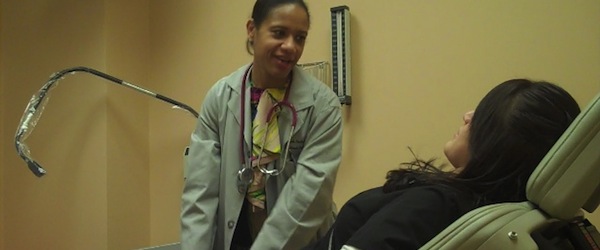
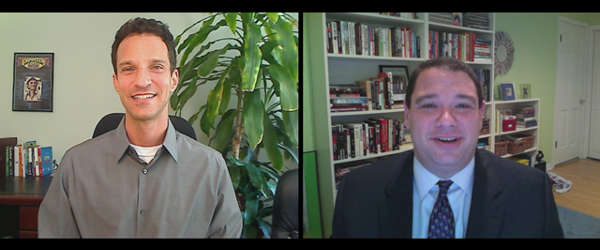
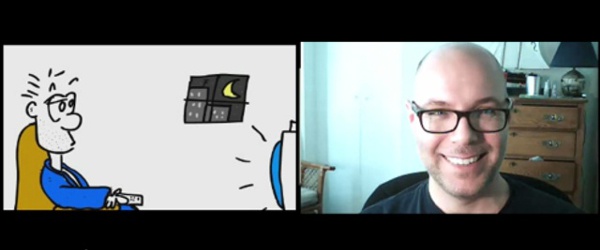
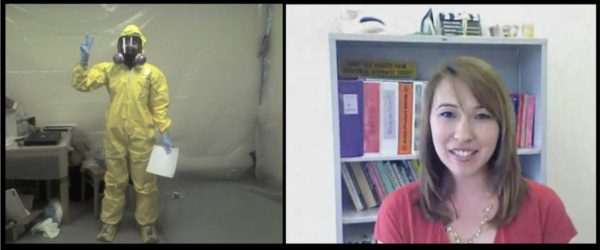
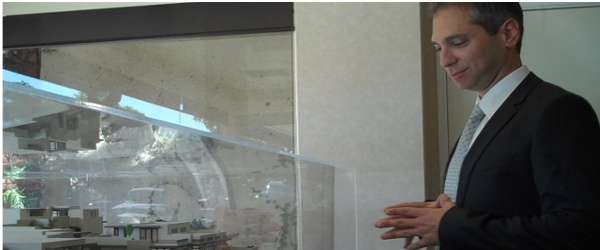
Thanks for the article..
This is an awesome video! really well put and heartfelt! I gotta share this website with other people!
Thanks again for your feedback Chris. Please do – tell everyone!